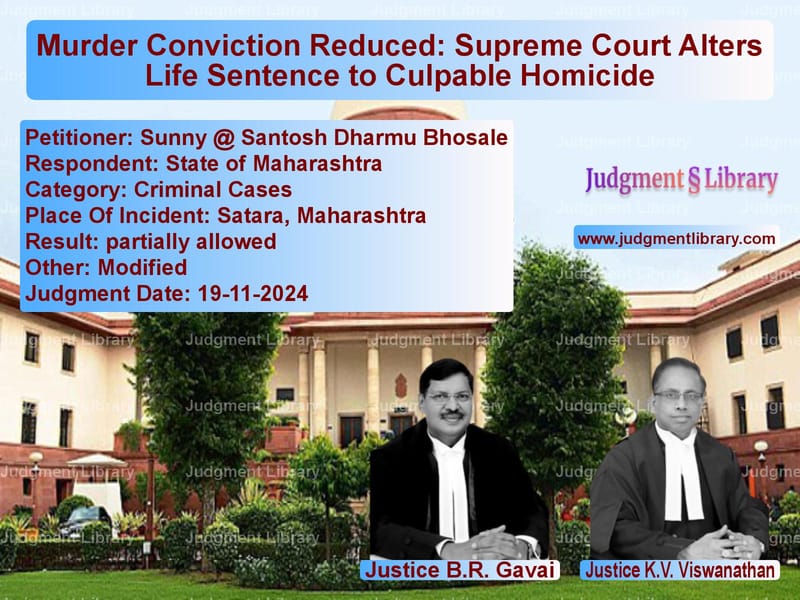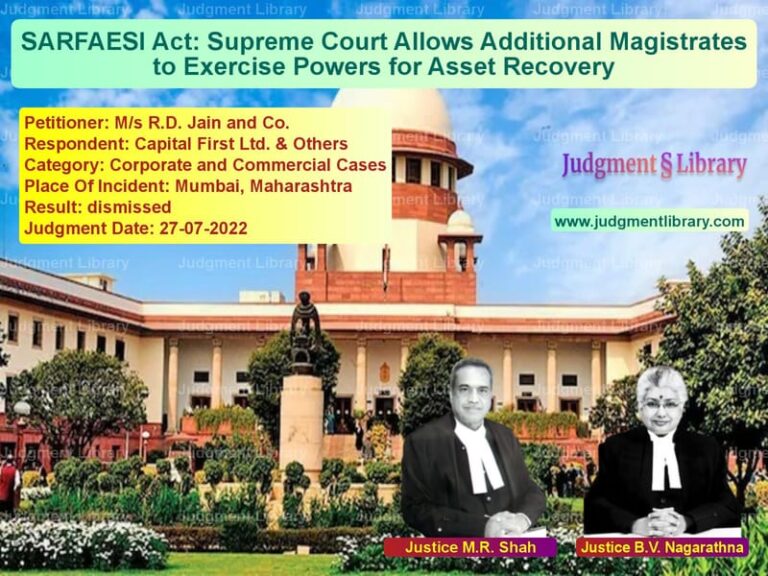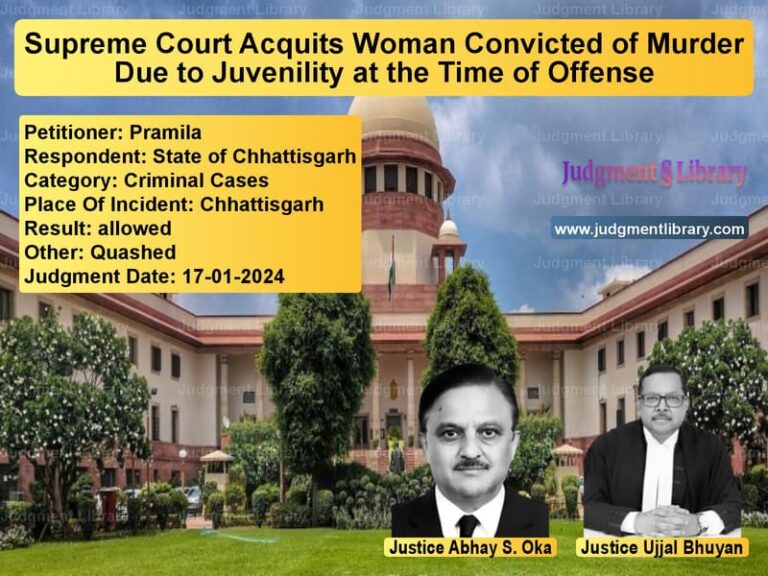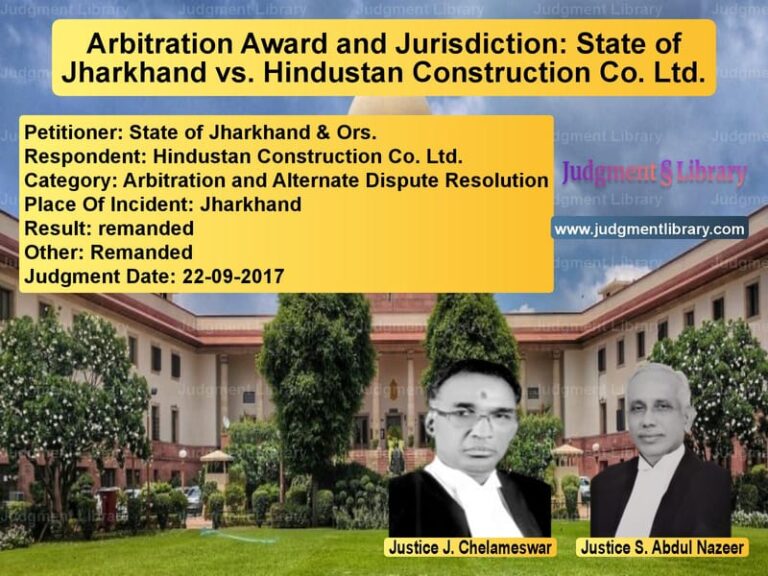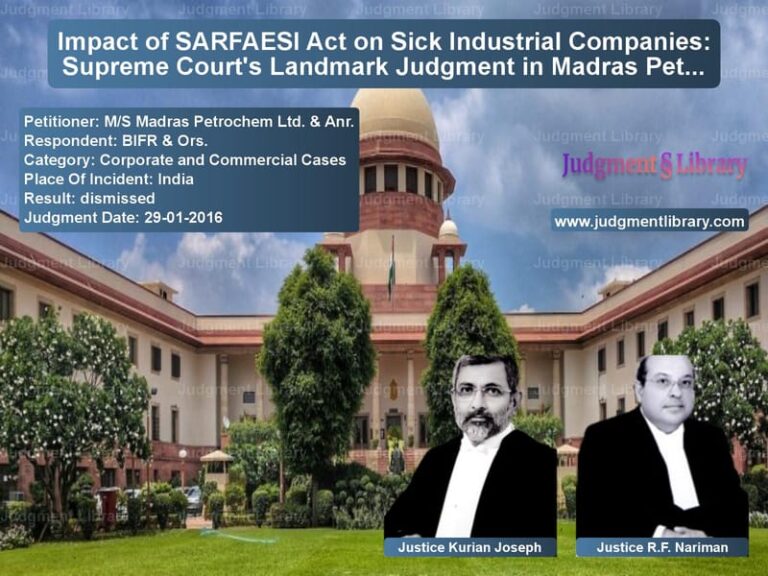Murder Conviction Reduced: Supreme Court Alters Life Sentence to Culpable Homicide
The Supreme Court of India recently delivered a landmark ruling in the case of Sunny @ Santosh Dharmu Bhosale vs. State of Maharashtra, altering a murder conviction under Section 302 of the Indian Penal Code (IPC) to culpable homicide not amounting to murder under Section 304 Part I of the IPC. This judgment clarifies legal principles regarding sudden fights and provocation in homicide cases.
Background of the Case
The case arose from an altercation on March 21, 2014, in Satara, Maharashtra. The appellant, Sunny @ Santosh Dharmu Bhosale, was accused of killing Gopal Bhosale following a heated argument over a financial dispute.
Sequence of Events
- At around 10:30 PM, the appellant arrived at the residence of Rajendra Bhosale (PW-5) and began verbally abusing him and his wife over an unpaid loan.
- Gopal Bhosale, who was visiting Rajendra’s home with his wife Sunita Bhosale (PW-6), intervened and urged the appellant to resolve the matter peacefully.
- The appellant initially left but then challenged Gopal Bhosale to confront him outside.
- Gopal followed the appellant towards the road leading to Khadkoba Temple, where the altercation escalated.
- The appellant assaulted Gopal with a bamboo stick, hitting him on the face and head, causing fatal injuries.
- Upon hearing the commotion, Mangesh Bhosale (PW-3) and Aniket Bhosale rushed to the scene and witnessed the attack.
- The injured Gopal was taken to Rural Hospital, Khandala, where doctors declared him dead.
- Witness Sharad Bhosale (PW-4) lodged an FIR (No. 54 of 2014) at Khandala Police Station against the appellant.
Trial Court Conviction
The Sessions Court convicted the appellant under Section 302 of the IPC and sentenced him to:
- Life imprisonment.
- A fine of Rs. 500.
High Court Upholds Conviction
The appellant challenged the trial court’s decision in the Bombay High Court. The High Court upheld the conviction, ruling that:
- The prosecution had proven its case beyond a reasonable doubt.
- Eyewitnesses provided consistent testimonies.
- The cause of death was directly linked to the appellant’s assault.
Arguments Presented in the Supreme Court
Appellant’s Arguments
Senior Counsel D.N. Goburdhun, representing the appellant, argued:
- The testimonies of witnesses contained contradictions.
- The incident occurred in the heat of the moment during a sudden altercation.
- The appellant did not premeditate the attack or intend to kill the victim.
- The weapon used (a bamboo stick) was not lethal in nature.
State’s Arguments
Representing the State of Maharashtra, Counsel Siddharth Dharmadhikari countered:
- The attack was deliberate and aimed at a vulnerable part of the body.
- The appellant’s actions led directly to the victim’s death.
- The trial court and High Court had correctly interpreted the evidence.
Supreme Court’s Observations
The Supreme Court examined key aspects of the case, including:
Nature of the Attack
- The appellant did not carry a weapon but used a readily available bamboo stick.
- The attack occurred after a verbal exchange, indicating provocation.
- The injuries, while serious, did not necessarily indicate an intent to commit murder.
Lack of Premeditation
- The altercation happened spontaneously following a heated argument.
- The victim followed the appellant, suggesting mutual aggression.
- There was no evidence of prior planning or motive.
Legal Precedents
The Court referred to several cases, including:
- K.M. Nanavati vs. State of Maharashtra (1962) – The distinction between murder and culpable homicide.
- Virsa Singh vs. State of Punjab (1958) – The importance of intent in determining culpability.
Final Judgment
The Supreme Court ruled:
“The conviction under Section 302 IPC is altered to one under Part I of Section 304 IPC.”
The Court noted that:
- The appellant had already served more than 9 years in prison.
- With remission, he had completed 12 years of his sentence.
- The sentence served was sufficient, and he was released.
Implications of the Judgment
The ruling has significant legal implications:
1. Clarification of Sudden Provocation
The judgment reinforces that an unplanned attack during an altercation can lead to conviction under Section 304 rather than Section 302 IPC.
2. Importance of Weapon and Injury
The choice of a non-lethal weapon (bamboo stick) influenced the decision to downgrade the offense.
3. Consideration of Time Served
By accounting for time already served, the Court ensured fairness in sentencing.
Conclusion
The Supreme Court’s ruling in Sunny @ Santosh Dharmu Bhosale vs. State of Maharashtra is a crucial judgment clarifying the distinction between murder and culpable homicide. The decision underscores the importance of intent, provocation, and circumstantial factors in determining criminal liability. The ruling also highlights the judiciary’s commitment to balancing justice with fairness in sentencing.
Read also: https://judgmentlibrary.com/supreme-court-orders-retrial-in-evidence-tampering-case-from-1990/
Petitioner Name: Sunny @ Santosh Dharmu Bhosale.Respondent Name: State of Maharashtra.Judgment By: Justice B.R. Gavai, Justice K.V. Viswanathan.Place Of Incident: Satara, Maharashtra.Judgment Date: 19-11-2024.
Don’t miss out on the full details! Download the complete judgment in PDF format below and gain valuable insights instantly!
Download Judgment: sunny-@-santosh-dhar-vs-state-of-maharashtra-supreme-court-of-india-judgment-dated-19-11-2024.pdf
Directly Download Judgment: Directly download this Judgment
See all petitions in Attempt to Murder Cases
See all petitions in Fraud and Forgery
See all petitions in Public Sector Employees
See all petitions in Judgment by B R Gavai
See all petitions in Judgment by K.V. Viswanathan
See all petitions in partially allowed
See all petitions in Modified
See all petitions in supreme court of India judgments November 2024
See all petitions in 2024 judgments
See all posts in Criminal Cases Category
See all allowed petitions in Criminal Cases Category
See all Dismissed petitions in Criminal Cases Category
See all partially allowed petitions in Criminal Cases Category

